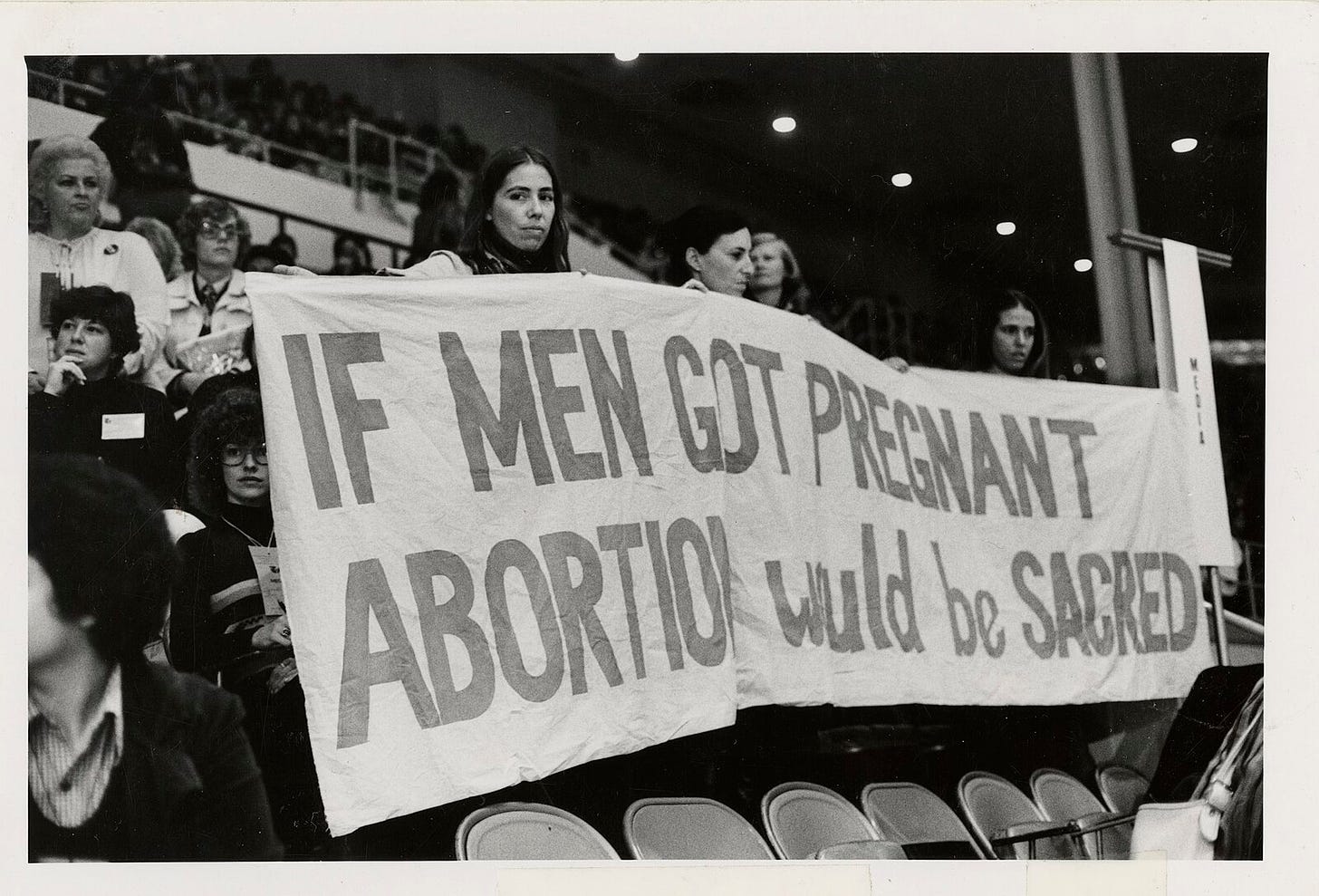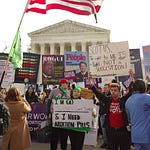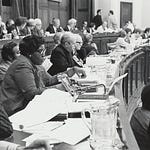Delegates holding a pro-choice banner at the 1977 National Women’s Conference in Houston, Texas. Photo credit: National Archives/Wikimedia Commons
Before Vice President Kamala Devi Harris, there was Hillary Clinton—also, Jeannette Rankin, Nellie Tayloe Ross, Geraldine Ferraro, Patsy Mink, Margaret Chase Smith, Nikki Haley, Carol Mosely Braun, and dozens of other women “firsts” in politics. Most importantly, there was a woman who never ran for office, who most of us knew little about until recently, and who was also lifted up by feminism: Shyamala Gopalan. We’ll get back to her.
Some of you probably noticed that I left someone out. I call it leaving the best for last. Because the first that Harris, the Democratic nominee for President of the United States, is most compared to is Congresswoman Shirley Anita St. Hill Chisholm, the first Black woman to be elected to Congress, and who represented New York’s 12th district in Brooklyn from 1969 to 1983.
There are obvious similarities. Like Chisholm, Harris is a Black woman, a Democrat, and the daughter of immigrants. And as Chisholm did, Harris is running for President. If she succeeds, Harris will become the first woman, as well as the first Black and South Asian woman, to become President of the United States.
There’s another similarity: both Chisholm and Harris promised that, as President, they would represent the people.
In 1972, the United States, in the throes of a civil rights--and a newer, feminist--revolution, was not yet ready for Shirley Chisholm. At the convention, Chisholm was ultimately abandoned by feminists, civil rights leaders, and her own Congressional Black Caucus, all of whom rushed to support a white man, North Dakota Senator George McGovern—who then lost the election to Richard M. Nixon.
Yet, when Harris took the stage at the Democratic National Convention on August 23, 2024 to accept her party’s nomination, she placed herself squarely in the Black feminist social justice tradition that Chisholm had pioneered a half century earlier. In her acceptance speech before the Democratic National Convention, Harris described her lifetime commitment as an attorney to extend power to the powerless, and voice to the voiceless.
Could the United States be at a moment when feminist politics are just—politics? Harris presents herself as a feminist, supports traditionally feminist causes, talks about women, but rarely says the word “feminist.” She shows; she doesn’t tell. Harris disclosed in her speech, for example, that her best friend being sexually abused by a family member, and her mother’s admonition not to complain, but to “do something,” propelled her into her role as a prosecutor.
In the years since Dobbs triggered a wave of restrictions to reproductive freedom and attacks on LGBT people, Harris has been President Joe Biden’s main link to feminist politicians and organizations across the nation. But she never labels her portfolio as the feminist causes that they have, historically, been. Rather, Harris presents the health and well-being of women and children as things a just society requires.
Perhaps we no longer need to say the word “feminist” because there is no Kamala Harris, and there is no Democratic party as we know it in 2024, without feminism. In today’s episode, I’ll let journalist Clara Bingham tell you why. In her new book, The Movement: How Women’s Liberation Transformed America 1963-1973 (Simon & Schuster, 2024), Bingham tells the story of feminism’s rebirth in the 1960s as a movement that empowered women—politically, institutionally, socially, and culturally. It’s the story of a social revolution, made by and for women.
Weaving radical feminist history into a story about liberal and institutional organizing, it’s easy to see why the multi-faceted women’s movement that exploding in 1972 made a Chisholm candidacy possible, and ultimately failed her; how radicals and liberals traded ideas; how organizations flourished, fell apart, and were reborn; and how ordinary, anonymous women like Kamala Harris’s mother—that’s right, Shyamala Gopalan Harris-- climbed the ladders that feminism built to open doors for themselves and their daughters.
Show notes:
Clara begins by explaining that her storytelling style in The Movement, using only oral histories and primary sources, to tell a story, evolved from the method used by George Plimpton and Jean Stein, Edie: American Girl (Grove Press, 1982).
Clara references her book Witness to the Revolution: Radicals, Resisters, Vets, Hippies, and the Year America Lost Its Mind and Found Its Soul (Random House, 2016), an account of activism during the 1969-1970 school year, which left her wanting to know more about the women’s movement.
Clara praised Susan Brownmiller’s memoir of the radical feminist movement, In Our Time: Memoir of a Revolution (The Dial Press, 1999).
Claire and Clara discuss disagreements over fact in histories of the movement: Claire believes that the first women’s liberation group was formed in Seattle.
Clara argues that the Title IX legislation advanced equality for women on college campuses, partly through athletic scholarships. You can read more about Title IX in Susan Ware, Game, Set, Match: Billie Jean King and the Revolution in Women's Sports (University of North Carolina Press, 2011).
Claire and Clara discuss the “No More Miss America” protest in Atlantic City on September 7, 1968. You can read a press release about the event from the women’s liberation group Redstockings here.
Jo Freeman’s study of why women became radical feminists, The Politics of Women's Liberation: A Case Study of an Emerging Social Movement and Its Relation to the Policy Process (David McKay Company, 1975).
Claire references Ms. Magazine, which is still available as an online, nonprofit, publication.
Clara pinpoints the rise of popular interest in feminist books with the publication of Kate Millet’s Sexual Politics (Doubleday, 1970)
Claire talks about the Jane Collective, a group of Chicago feminists who facilitated safe, affordable abortions. You can learn more about these courageous women from watching the documentary The Janes (Tia Lessin and Emma Pildes: HBO Max, 2022).
You can download this podcast here or subscribe for free on Apple iTunes, Spotify, Google Podcasts, or Soundcloud. You can also keep up with Political Junkie content and watch me indulge my slightly perverse sense of humor on X, Instagram, Threads, YouTube, and TikTok.
If you enjoyed this episode, why not try:
Episode 45, Why Abortion Alone Does Not Make Women Free: Historian Felicia Kornbluh and I mark Roe v. Wade with a conversation about "A Woman's Life Is a Human Life: My Mother, Our Neighbor, and the Journey from Reproductive Rights to Reproductive Freedom."
Episode 34, We Demand Equality--NOW! A conversation with historian Katherine Turk about her new book, "The Women of NOW: How Feminists Built an Organization That Transformed America."
Episode 33, Seattle, the Feminist Soviet of Washington: A conversation with historian Barbara Winslow about her book "Revolutionary Feminists: The Women's Liberation Movement in Seattle."
And here’s a bonus: all new annual paid ubscriptions include a free copy of my book about political media, Political Junkies: From Talk Radio to Twitter, How Alternative Media Hooked Us on Politics and Broke Our Democracy (Basic Books, 2020.)












Share this post